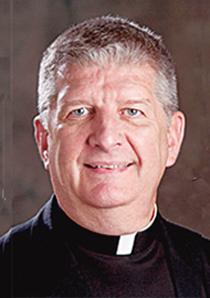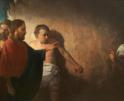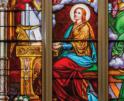
Faith
A very important task is for the committee to open its ears to the parishioners' feedback about the parish's liturgical life.

O'Grady
Have you ever been on a committee or perhaps asked to be on one? Whenever the words committee, commission, board, or council are mentioned, I think there are three possible reactions: run in the opposite direction, jump at the offer, or ponder and accept.
Often, a committee is seen as a graveyard for ideas or progress, yet they can also yield much good.
Dare I suggest that a committee can be a ministry? Actually, the church says this regarding liturgy committees. These can exist at the level of a conference of bishops (in the U.S. -- the USCCB), in a diocese, or in a parish. Not surprisingly, membership on such committees requires a generosity of spirit and time, a competence in the area or field for which the committee is constituted, and some initial and ongoing formation.
Any member of a divine worship committee at any of the levels mentioned above would need to have some basic understanding of the church's worship, including familiarity with essential documents, the liturgical books, and the environment and culture of the parish, diocese, or nation.
A committee cannot really function well if there are too many members, nor can it respond to its responsibilities if there are too few. Consensus is always the better way to move forward rather than constant voting. For most committees, 12-15 members would be sufficient.
If this is a parish committee, then the pastor, any parochial vicars, deacons, and few parishioners will be members; it would be wise to have individual members who represent the various other ministries, such as musicians, sacristans, lectors, and extraordinary ministers of Holy Communion.
There needs to be a clear outline, including a statement of purpose, membership qualifications, information about the time commitment (i.e., number and length of meetings), officers, at least a chair and secretary, members' and officers' terms, and a statement about the relationships between this committee, the pastor, other parish committees, and diocesan committees and worship offices.
Consistency in the format of meetings is very helpful. A typical meeting would consist of prayer, approval of previous minutes, any reports from the pastor, members, etc., new agenda items, and reports from any subcommittees or related committees. In some parishes, there may be separate committees such as music or environment and art. A divine worship committee also needs to communicate with the parish pastoral council and the parish finance council, as issues from divine worship are necessarily involved and affected by the responsibilities of those two councils.
A very important task is for the committee to open its ears to the parishioners' feedback about the parish's liturgical life. This could involve an observation about the audio system, the demographics of each Mass, the need for more or fewer of the various ministers at a particular liturgy, the Mass schedule, and yes, even to evaluation of musical participation, lectors' proclamation of readings, and the homily.
Often, committee members will receive compliments and complaints about the parish's liturgical life. Thick skin is the order of the day, and most often, the comments are being made out of sincere concern.
Yes, there can be constant complainers. Yes, there can be experts without expertise. Usually, it's more related to preference or taste rather than precise issues. Sometimes, a simple invitation to offer an option or an alternative may help. Sometimes, there is no alternative, and that needs to be explained as clearly and as directly as possible. In some cases, members might have to refer to a "higher authority," that is, the pastor.
The committee needs to be seen as a group of parishioners who are convinced of the importance of the parish's liturgical life, who, by their own active participation in all phases of parish life but especially in its liturgical life, witness that this is a priority. Members need to be examples and models of that priority.
The committee is one of the behind-the-scenes or even unseen ministries that help the parish and each parishioner grow in faith by the worship they offer to God and the common prayer that is the responsibility of each parishioner.
If you are already serving or in case you get called on to be a member of a divine worship committee, it would be wise to be comfortable with all the responsibilities that can arise. Check out the book "Guide for Liturgy Committees, Second Edition," published by Liturgy Training Publications, and the document "Guidelines for the Parish Liturgy Committee" by the Diocese of St. Cloud, freely available on the diocese's website at stcdio.org/liturgical-resources.
Recent articles in the Faith & Family section
-
Our Lady of DeliveranceJaymie Stuart Wolfe
-
The 'month of the dead' brings its own strange refreshmentBishop Robert Reed
-
Make New Friends, But Keep the OldMaureen Crowley Heil
-
A royal truthScott Hahn
-
St. Cecilia and hope in sacred songRichard Clark


















